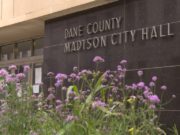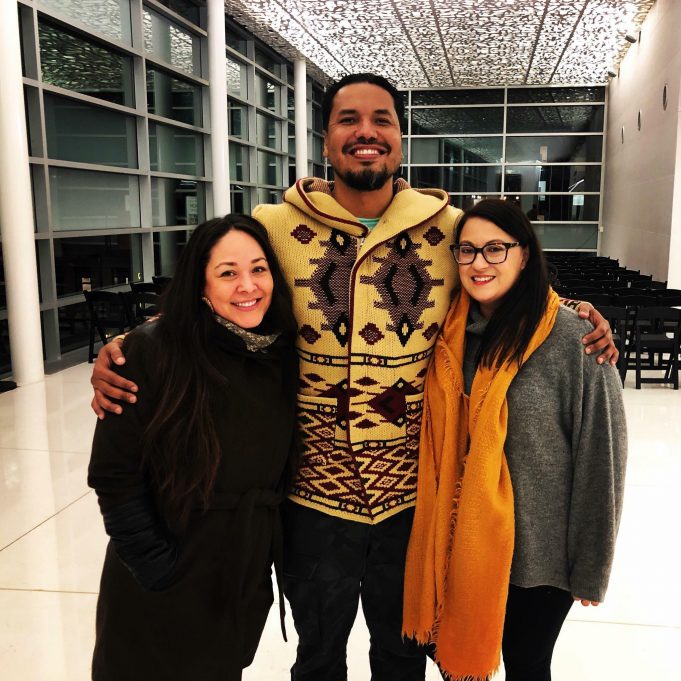Indigenous author, lawyer and activist Gyasi Ross visited the Central Branch of Madison Public Library on Nov. 7 for a Wisconsin Book Festival event titled “Speak the Truth.”
Gyasi Ross, a member of the Blackfeet Nation, wrote “Don’t Know Much About Indians (but I wrote a book about us anyways)” in 2011 and “How to Say I Love You in Indian” in 2014. The event was hosted as a collaboration between Madison Public Library and the Madison College Office of Equity, Inclusion and Community Engagement.
“It is extraordinary how powerful book events can be. Everyone knows about going to a concert or going to the movies but going to see the author of a book is a different experience,” Wisconsin Book Festival Director Conor Moran said.
Ross was selected as one of the authors to speak to a crowd of about 100 people who came to have a intimate experience with an author. Moran said festival events provide a unique curated experience for Madison residents to hear new perspectives.
“Every October and November is usually pretty busy with Native American Heritage Month so people ask me to come to their schools very graciously and I try to come to a few of them,” he said.

Ross has traveled to different universities on the East Coast making stops in Boston, Worcester, Mass., New York City and then he made his way to Ohio. He said he is no stranger to the state of Wisconsin.
“I’m in Wisconsin probably four or five times a year and I used to work for the Ho Chunk Tribe. I love it here,” Ross said.
He recently visited Nicolet College in northern Wisconsin to speak at a campus event. Ross said he finds Northern Wisconsin beautiful.
“Right here in Wisconsin you have the Menominee Forest and that’s one of the most sustainable forest in the world and that came because a chief named Oshkosh who has a city and a college named after him had the brilliance to translate his ancestral teaching to forestry,” he said.
Ross said indigenous brilliance benefits everybody in society. He also said having two Native women in Congress will offer a valued perspective to creating effective policy.
“There’s really no way to tiptoe around it that Native people have been largely absent from larger conversations about race, about equality, about justice, about economics, about agriculture, about politics,” Ross said.
Ross said he hopes can create conversations across cultures that results in more compassion, more understanding that results in realization that we’re all interdependent. He credits his outlook and philosophy on life to him growing up in Hip Hop culture.
“Hip Hop is all about multiculturalism and finding the best Spanish record. You know Cardi B got that “I like it like that” now- classic record. You find whatever’s working, whatever is really, really hot. You try something and put it together,” Ross said.

He said centering the most marginalized communities in the United States will benefit the collective. Ross also said structural racism has kept Native communities and other people of color from embracing their brilliance.
“We all rely upon each other. We’re all stuck here together whether we like it or not, all colors, all creeds, all ethnicities so why not try to find those common story lines and find out ways to work together to try to heal some of the common ailments we all have,” Ross said.
Ross said white people have to be brave and courageous when talking to fellow white people about race and justice but we all must take ownership of the harms we are complicit in.
Ross said he prefers accomplices over allies.
“To recognize the humanity. We also recognize the definity in every person,” he said. “The word ally implies there’s a difference between me and you. Accomplice means I have a vested interest in you.”
For Ross, embracing diversity and centering the most marginalized is not about generosity, altruism, or political correctness but empathy. He said the privilege must have a self-centered interest in helping their marginalized accomplice.
“It’s important to use history as a reference point. At the same time, we’re not constrained to repeat that and we have to practice our own volition, our own agency and self-determination to hopefully make better outcomes,” he said.
Ross said, however, this institution is messed up and party line politics have not worked for the country. He said the Democratic playing-it-safe-with-centrist politics will not attract the larger demographic of progressives.
“This isn’t about political party. This is about seeing the humanity and compassion in other people,” Ross said.
He shared his thoughts on unity and liberation throughout Wisconsin last week. Ross said he believes once the United States truly embraces diversity, we will experience a level of compassion and empathy people have never seen before.


































